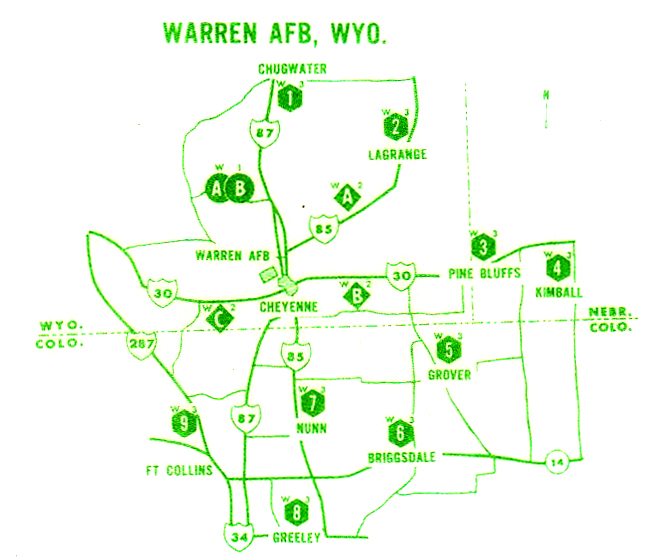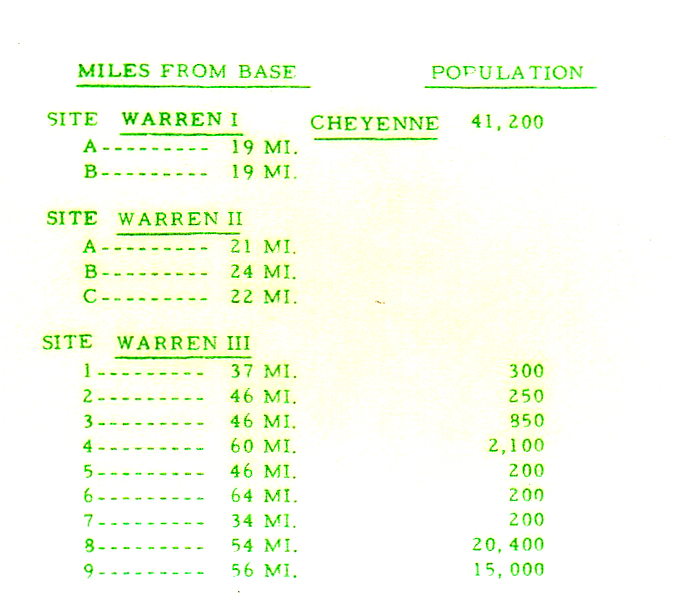Atlas Missile at F.E. Warren AFB Kansas
On November 21, 1957, the Department of Defense announced that F.E. Warren would become the nation's first ICBM base. Shortly thereafter, the base shifted to the Strategic Air Command from the Air Training Command.
Originally, the project design for the above-ground Atlas D ICBM launch and control facilities at "Site A" was to be completed by mid-May 1958 and construction finished in November 1959. However, design revisions forced addendums on the bid packages delaying the bid opening to July 15, 1958. To meet a previously set June 30th bid award deadline, the package was advertised without the critical Propellant Loading Skids, instrumentation, controls, expansion, anchorage and structural support, and site power facilities.
Despite these gaps, construction began at a location 23 miles northwest of Cheyenne for the facilities of the recently activated 706th Strategic Missile Wing. The Omaha District of the Army Corps of Engineers oversaw the construction at "Site A," which eventually consisted of two above-ground complexes with three launchers each. Because the Atlas D was radio-controlled from the ground, the launchers had to be clustered close to the radio transmitters.
The prime contractor, the George A. Fuller Company, worked through the fierce winter of 1958-1959 to get the job completed in 190 days. The project was not without problems, and many of these problems would later plague the construction efforts at other ICBM sites.
Inexperience, time pressure, remote locations, and constant modifications required to adjust the facility to support an evolving missile design hampered the construction effort. At Site A, also known as "Warren I," 35 modifications were made to the guidance facility and 117 to the launchers before Fuller completed the contract.
The were four work-stoppages over issues such as pay, hours, and the presence of non-union workers. There were no fatalities at this project; moreover, the number of disabling injuries was just below the average for all Corps of Engineers projects and about six times better than the national average.
On September 15, 1959, the first Atlas D missile to deploy away from Vandenberg AFB, California, went to the 564th Strategic Missile Squadron stationed at Warren I. A month later, F.E. Warren became the recipient of the first air transported Atlas missile.
With General Power (the Commander in Chief of SAC) present, the first Atlas D complex was turned over to the 564th SMS and declared operational on August 9, 1960.
As work proceeded at Warren I, the Corps contracted for yet another complex. In February 1959, bids were opened for "Warren II," a complex that would have three sites with three Atlas D launchers at each. The Blount Company won the bid to build "annexes B, C, and D" to be scattered to the northeast, southeast, and southwest of Cheyenne. Slow material deliveries, modifications, and 11 different work stoppages hindered the construction of these complexes. Slated for completion in February, Warren II was finally ready in the summer of 1960. The 565th Strategic Missile Squadron, activated on December 1, 1959, operated the nine launchers. On a positive note, the safety record at Warren II exceeded that at Warren I.
The Martin K. Elby Construction Company of Wichita, Kansas, submitted the low bid to construct Warren III, which would host the Atlas E missile. Because the Atlas E contained inertial guidance, the launch sites need not be concentrated. Nine Atlas Es would be scattered over a 60-square-mile area at single "coffin" launch sites. The term "coffin" was used because the missile laid on its side underground with the coffin roof at ground level. This configuration offered limited protection for the launcher. Work began on December 7, 1959. Coffin launchers in Wyoming were at Chug-water, Lagrange, and Pine Bluffs. One Atlas E launcher was located in Nebraska and five launchers were placed in Colorado at Grover, Briggsdale, Nunn, Greely, and Fort Collins.
As with Warren I and II, problems plagued construction. Delivery of steel was erratic in the wake of the national steel strike. Because of sites located in three states, the contractors had to recruit labor from many different locals. Consequently, work stoppages occurred at some individual sites while labor harmony prevailed at others. There were nine disabling injuries.
Again, Propellant Loading System (PLS) skids proved to be a challenge. In fairness to the contractor, Blaw-Knox, the Corps of Engineers admitted that compressed times for design and fabrication of this system and the attempts to use "off-the-shelf' components such as valves led to problems. Because of the rush to deploy, a prototype PLS for test and evaluation was not built.
Construction difficulties encountered at Warren and other ICBM sites would lead to an inter-service dispute over construction management. Eventually, the Corps of Engineers Ballistic Missile Construction Office (CEBMCO) was formed to oversee construction.
On October 1, 1960, the 549th Strategic Missile Squadron became the last Atlas E SMS to be activated. The 549th SMS was re-designated 566th SMS on July 1, 1961. On that same date the parent 706th Strategic Missile Wing stood down. Command responsibilities at Warren were assumed by the recently activated 389th Strategic Missile Wing.
In May 1964, as the Atlas D missiles were being phased out, the 389th Strategic Missile Wing received SAC's last operational readiness inspection for this system. In September, SAC deactivated the 564th SMS. During the following March, the 566th SMS would also be deactivated, completing the phaseout of the Atlas E at Warren.
The departure of the Atlas squadrons did not mark the end of F.E. Warren's role in the ICBM program. On October 15, 1962, Morrison-Knudsen and Associates won the contract to construct 200 Minuteman silos over an 8,300-square-mile area of Wyoming, Nebraska, and Colorado, located north and east of the base. Morrison-Knudsen subcontracted the task of excavating the silos to the Meridith Drilling Company of Denver. Meridith used an innovative technique of equipping cranes with 6-, 10-, and 15-foot diameter augers. These "biggest post-hole diggers on earth" allowed the crews to average drilling out one silo per day between November 1962 to June 1963. The first site, A-6, reached completion on October 2, 1963.
Besides the innovative drilling technique, the project was blessed with milder than normal weather conditions, which allowed for accelerated progress during the winter months. But access to the 200 sites proved to be a challenge. Thirty-eight miles of offsite roads had to be constructed. The Corps of Engineers Omaha Office handled numerous complaints from local owners claiming property damages. The presence of a Missile Site Labor Committee helped alleviate labor problems. The four work stoppages caused minimal impact to the construction effort. During construction, five fatalities occurred.
While construction proceeded, on July 1, 1963, the Air Force activated the 90th Strategic Missile Wing. Over the next year, the four component strategic missile squadrons activated with the 400th SMS became the last Minuteman I "B" unit to stand up on July 1, 1964.
In November 1972, SAC initiated the Minuteman Integrated Improvement Program. The program entailed silo hardening and upgrading command data buffers, which allowed for quicker missile re-targeting. In addition to receiving upgraded silos and launcher control facilities, Warren also received new missiles. With conversion to the Minuteman III model, Warren's last Minuteman I model went off alert status in September 1974.
On November 22, 1982, in a decision statement for Congress, President Ronald Reagan stated his plan to deploy the MX missile dubbed "Peacekeeper" to super hardened silos located at F.E. Warren. The Vice Commander-in-Chief of SAC, Lieutenant General George Miller, explained that location, geography, and geology were key factors for selecting the base.
The initial plan was to deploy 100 Peacekeepers in silos of the 400th and 319th Strategic Missile Squadrons. In July 1984, construction began for Peacekeeper support facilities at Warren. From 1986 through 1988, 50 Peacekeepers would be back fitted into silos formally occupied by Minuteman IIIs of the 400th Strategic Missile Squadron. Boeing Aerospace Company served as the primary contractor for re-configuring the silos to accept the new missile. Unlike Minuteman, which was placed in the silo with a special transporter erector, Peacekeeper had to be assembled stage-by-stage within the silo.


Look here for more general information about F.E. Warren Air Force Base.